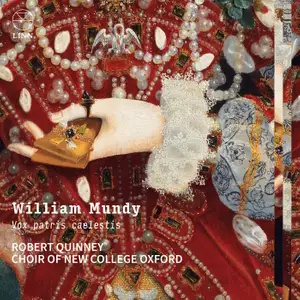
William Mundy (c.1529-1590)
Vox patris caelestis
Choir of New College Oxford / Robert Quinney
rec. 2025, St. John the Evangelist Church, Oxford, UK
Linn CKD775 [58]
William Mundy’s music has been anthologised, but I am not aware of a disc devoted only to his works since The Sixteen’s pioneering 1988 recording on Hyperion (CDA66319). This disc has a couple of pieces not recorded by Harry Christopher’s choir, and here we have boys on the treble lines.
Conductor Robert Quinney wrote ‘A note on voices and performance pitch’. He tells us that the boys will sing what is named the triplex line, the top one. Where it exists, they will sing the Medius as well, the second one down – doubled by altos if there are both parts. He also reminds us that they sing at A=466, a semitone higher than ‘concert pitch’. In the quite well-known four-voiced anthem O Lord the maker of all thing (to the text sometimes attributed to Henry VIII), they are the standard minor third higher than notated.
If you have come across the Mundy name before, then it seems more than likely that the London-based family included William’s son John (c.1555-1630) who, among other things, contributed to Morley’s collection The Triumphs of Oriana. The playwright Anthony Munday is probably not directly related. William, who sang with the Chapel Royal, was composing at a challenging time for composers, with at least three monarchs in his lifetime. The large-scale Latin works were fit for the reign of Queen Mary, the English anthem more suited to the straitened age of Elizabeth 1st. A handful of other anthems in English seem to be rarely heard.
The earliest pieces, such as the Magnificat and the Kyrie,are sung ‘in alternatim’. Verses of plainchant alternate with polyphony which normally is based on, or uses, the plainchant in at least one of the parts. Remarkably, the plainchant in A solis ortus cardine can be found in the bass part; that opens up all sorts of intriguing contrapuntal possibilities.
The major work here is the incredible Vox patris caelestis. I was surprised that this version, at over twenty minutes, takes three minutes more over its vast canvas that The Sixteen’s. One has to admire the physical effort that the choir would have put into the recording – and quite a performance it is.
The work must date from the reign of Queen Mary. Unusually, we know who wrote the text: one William Forrest, a Franciscan friar, who died in 1581. This is appropriate for the so-called Assumption of the Virgin Mary, a feast day which falls on August 15th. The poem says: ‘she is translated from her mortal body’. The text is also inspired by The Song of Songs, with lines like ‘the voice of the turtle dove, the song of your devoted lover’s only desire’.
Each of the music’s three sections begins with a reduced scoring which grows into a full closure for the whole six-part choir, with increasingly close, imitative counterpoint. The notes hold up the tantalising possibility that this great work was composed for Queen Mary’s Accession in 1553.
The text of Silve vigilem is anonymous. In its brief three minutes, the performance is a good opportunity to hear the choir at its best. Note the way the phrases are shaped in all parts, and the subtle use of dynamics based on the text. Remember, though, that these are largely down to the conductor’s interpretation.
The list of choir members, given in the booklet, amounts to over forty singers, with many extras, including two female altos; some only sing in the main work. There is an insightful booklet essay, and ‘A note on voices and performance pitch’ by Quinney. The clear texts and colour photos make this a very welcome addition to the Renaissance music catalogue. We can say with certainly that William Mundy, as his contemporaries understood, is in the same league as Thomas Tallis and William Byrd.
Gary Higginson
Buying this recording via a link below generates revenue for MWI, which helps the site remain free



Contents
A solis ortus cardine
Vox patris caelestis
Videte miraculum
Kyrie
Silve vigilem
Magnificat
O Lord, the maker of all thing

















